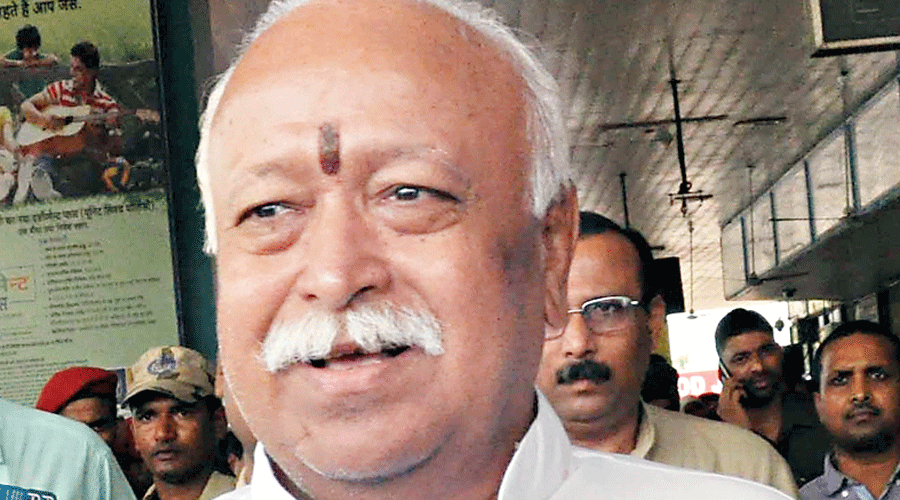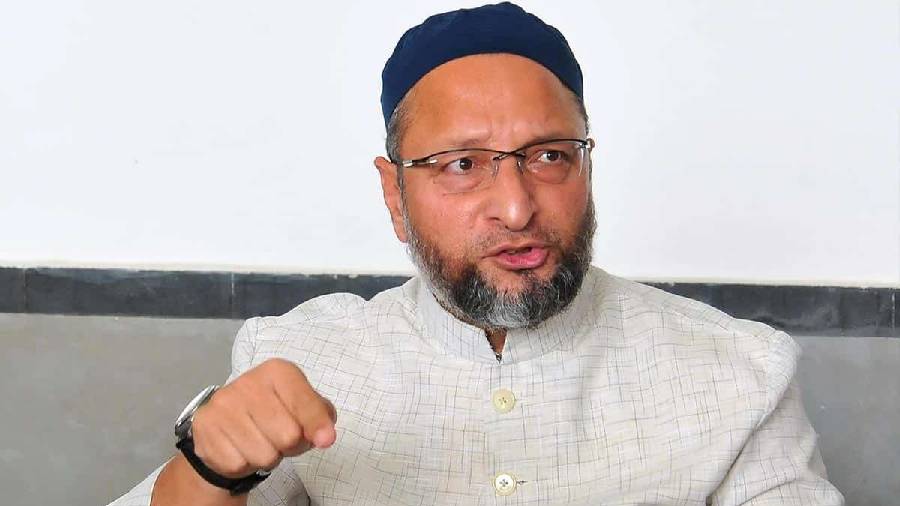RSS chief Mohan Bhagwat on Wednesday sought to project the Sangh as a symbol of “brotherhood and amity” but in the same breath raised the spectre of “religion-based population imbalances”, making the pitch for the second time in a row in his annual Vijaya Dashami speech.
Bhagwat also spoke about conversions and linked them to “population imbalances”, sought to indirectly accuse Muslims of not condemning terror incidents and claimed that the idea of a “Hindu Rashtra” was gaining popularity.
The RSS chief said India needed a well-thought-out and comprehensive population policy that would be equally applicable to all communities, adding that religion-based “population imbalance” should not be ignored.
“Along with population control, balance on community basis is a subject that should not be ignored,” Bhagwat said in his address at the RSS headquarters in Nagpur.
“Population imbalances lead to changes in geographical boundaries,” Bhagwat cautioned, citing the examples of East Timor, South Sudan and Kosovo and claiming they emerged from “population imbalances”. He said India had experienced such a phenomenon 75 years ago, a reference to Partition, and added that it should not be allowed again.
This is the second time in a row that the perceived population imbalance has figured prominently in the annual Vijaya Dashami speech of Bhagwat, the chief of the BJP’s parent outfit. Such a claim feeds into the “Hindu khatre mein hain (Hindus are in danger)” narrative that the Right wing and its propaganda machinery have been assiduously pursuing.
Last year too, Bhagwat had raised an alarm over the population growth rates of different religious groups, claiming it might pose a threat to the “unity, integrity and cultural identity of the country”. Then too he had called for a national population policy.
The thrust on the issue makes it clear that after achieving the goal of a Ram temple in Ayodhya and the dilution of Article 370 in Jammu and Kashmir, the Sangh now expects the Narendra Modi government to come up with a population policy.
The significance of this year’s message lies in the fact that it comes against the backdrop of Bhagwat’s fresh outreach towards Muslims, highlighted by his recent meeting with a group of prominent citizens from the community and a visit to a mosque and a madrasa.
The issue of population growth among Muslims had figured when former chief election commissioner S.Y. Quraishi and some others had met Bhagwat. It was pointed out at the meeting that population growth among Muslims had come down sharply over the years.
“The difference between the Hindu and Muslim total fertility rates, which 30 years ago was 1.1, has come down to 0.3 since Muslims are adopting family planning much faster than the Hindus,” Quraishi wrote about the meeting.
Despite this fact, Bhagwat flagged the issue again, raising the fear of the country’s division.
“There has to be a balance among the communities in this country. Alongside the differences in birth rate, conversions by force, lure or greed and infiltration are also big reasons. All these factors have to be mulled over,” he said.
Bhagwat, known for speaking in many voices by sounding conciliatory and controversial at the same time, referred to his Muslim outreach in the speech, claiming it was part of the Sangh’s effort to organise the society.
“This spirit has been present since the time of Doctor Saab (Sangh founder B.K. Hedgewar) but it only came out in the open when Dr Jilani met Guruji (M.S. Golwalkar). Such conversations are increasing and it is our wish to continue,” he said.
Bhagwat said some people were spreading the fear among the minorities that “RSS wale maarenge (the RSS will target you)” and because of this scare-mongering he and other Sangh functionaries were meeting members of the minority community.
“The Sangh has resolved to stand for brotherhood, amity and peace.… We (the RSS) don’t want to scare anyone or conquer others. We just don’t want to be conquered,” he said.
The RSS chief sought to indirectly accuse Muslims of not condemning terror incidents.
“Incidents of unspeakable brutality took place in Udaipur and Amravati. The entire society opposed them. Though it doesn’t happen always but this time some prominent people from the Muslim community too opposed them and termed it as anti-Islamic,” Bhagwat said, adding that “this must not be an exception”.
“This manner of protest should not be an isolated phenomenon within the Muslim society, rather it should become the nature of their large sections,” he said.
In Udaipur and Amravati, a tailor and a pharmacist were killed after they supported suspended BJP spokesperson Nupur Sharma over her comments denigrating the Prophet.
Bhagwat went on to indirectly tell Muslims to be like Hindus. “The Hindu society is outspoken in such matters even when the accused is a Hindu. Whatever the extent of the provocation, protests always have to be within the boundaries of law and the Constitution,” he said.
Bhagwat claimed the RSS’s concept of a “Hindu Rashtra” was being taken seriously because the organisation was receiving the “affection and confidence of the people”.
“Many people agree with the concept, but are opposed to the word ‘Hindu’ and they prefer to use other words. We don’t have any issue with that. For the clarity of concept — we will keep emphasising the word Hindu for ourselves,” he said.
Bhagwat claimed that the “popularity and acceptability” of the Sangh was driving some to spread fear among the minorities.
The annual address was also used to indirectly counter Congress leader Rahul Gandhi’s repeated attack on the RSS for being “anti-women”. Mountaineer Santosh Yadav was invited as chief guest of the event, the first time a woman had been called to an RSS chief’s Vijaya Dashami address. Bhagwat talked extensively about empowerment, stressing how society cannot progress without women.
Bhagwat had praise for the Narendra Modi government. The RSS chief cited India’s aid to crisis-hit Sri Lanka and the stand taken on the Russia-Ukraine conflict as a sign of the country being heard at the global level.
Bhagwat claimed that the Indian economy was returning to pre-Covid levels and sought to give a clean chit to the government on the job crisis, saying the Centre alone can’t solve the problem and that society must come forward to create opportunities and become self-reliant.












